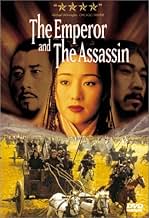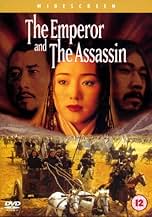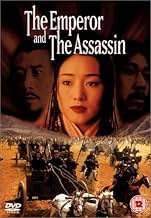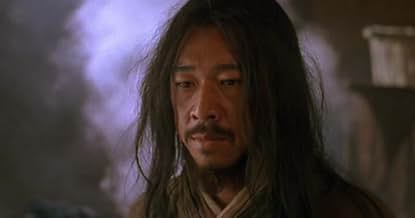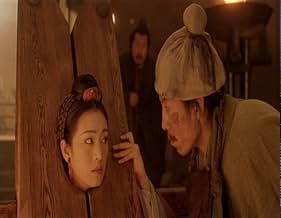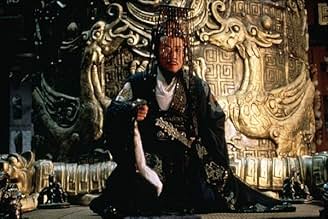IMDb-BEWERTUNG
7,2/10
6587
IHRE BEWERTUNG
Füge eine Handlung in deiner Sprache hinzuIn pre-unified China, the King of Qin sends his concubine to a rival kingdom to produce an assassin for a political plot, but as the king's cruelty mounts she finds her loyalty faltering.In pre-unified China, the King of Qin sends his concubine to a rival kingdom to produce an assassin for a political plot, but as the king's cruelty mounts she finds her loyalty faltering.In pre-unified China, the King of Qin sends his concubine to a rival kingdom to produce an assassin for a political plot, but as the king's cruelty mounts she finds her loyalty faltering.
- Regie
- Drehbuch
- Hauptbesetzung
- Auszeichnungen
- 7 Gewinne & 11 Nominierungen insgesamt
Empfohlene Bewertungen
This is an excellent film. No, it's not Mel Gibson in "Braveheart," but then, it's not trying to be. Actually, "The Emperor and the Assassin" probably has (thankfully) more in common with a Shakespearean production than a Hollywood blockbuster.
In the third century BC, the King of Qin is attempting to unite (in other words "conquer") the seven kingdoms of China. He has already overthrown the Kingdom of Han. Now he needs an excuse to invade the Kingdom of Yan.
This is where the Lady Zhao comes in. She and the King have been friends since childhood. They are obviously very much in love, but cannot marry for political reasons. Together they devise a plot. She will pretend to have fallen into disfavor with the King and escape to Yan. Once there she will convince the Prince of Yan to send an assassin back to kill the King. When the assassination fails, the King will have his excuse to invade Yan.
Once in Yan, however, Lady Zhao begins to reconsider. Hearing and seeing more and more examples of her old childhood friend's ruthlessness, she begins to wonder if the King may need to be assassinated for real.
One sure sign that you're not watching a Hollywood production is the final encounter between the King and the assassin. Unlike a Hollywood movie where the hero and villain are clearly defined and the final outcome already predetermined, this is a fight that could truly go either way.
This is a well crafted and well acted story of a tumultuous time in Chinese history. There is a mixture of both incredible beauty and incredible ugliness. Most beautiful of all, however, is Gong Li as the Lady Zhao. I grow more and more convinced every time I see her that Gong Li is the most beautiful woman in the world.
I must say, however, that she does have one unintentionally funny line in this film. Early on Gong Li asks one of her servants "Do I have a beautiful face?"
Duh!!!
In the third century BC, the King of Qin is attempting to unite (in other words "conquer") the seven kingdoms of China. He has already overthrown the Kingdom of Han. Now he needs an excuse to invade the Kingdom of Yan.
This is where the Lady Zhao comes in. She and the King have been friends since childhood. They are obviously very much in love, but cannot marry for political reasons. Together they devise a plot. She will pretend to have fallen into disfavor with the King and escape to Yan. Once there she will convince the Prince of Yan to send an assassin back to kill the King. When the assassination fails, the King will have his excuse to invade Yan.
Once in Yan, however, Lady Zhao begins to reconsider. Hearing and seeing more and more examples of her old childhood friend's ruthlessness, she begins to wonder if the King may need to be assassinated for real.
One sure sign that you're not watching a Hollywood production is the final encounter between the King and the assassin. Unlike a Hollywood movie where the hero and villain are clearly defined and the final outcome already predetermined, this is a fight that could truly go either way.
This is a well crafted and well acted story of a tumultuous time in Chinese history. There is a mixture of both incredible beauty and incredible ugliness. Most beautiful of all, however, is Gong Li as the Lady Zhao. I grow more and more convinced every time I see her that Gong Li is the most beautiful woman in the world.
I must say, however, that she does have one unintentionally funny line in this film. Early on Gong Li asks one of her servants "Do I have a beautiful face?"
Duh!!!
This three-hour Chinese epic, set in 220 B.C., may ultimately amount to a familiar theme of an Emperor's idealistic dream of peace through unification mutating into corrupted isolation, and there's nothing inherently challenging about the film, but it's a compelling narrative, crammed with intrigue and passion and betrayal and epic events told in vivid strokes. Even for those not drawn to such historical spectacles for their own sake, it's an astonishing feast for the eyes: the scene depicting the coup attempt of the Marquis is one of the most staggering evocations of physical space and grandeur in memory, and the battle scenes are memorable both in their scope and their immediacy. The title sums up the film's use of compelling contrasts - huge plainland vistas set against intimate horrors; the noblest of motives set against the most degraded; hope turning to dust. If you've never seen a three-hour Chinese epic, this wouldn't be a bad place to start.
This is an epic film about the unification of the ancient kingdoms of China in the third century BC. What makes it interesting is the tragic downfall of the king and all the palace intrigue going on around him. It reminded me a bit of "King Lear" and some of the other Shakespeare plays.
The king starts out with noble ambitions, to unify the kingdoms under one ruler and to stop all the quarrelling so that the people can prosper and lead better lives. He and his childhood sweetheart, played beautifully by Li Gong, concoct a scheme whereby she pretends to go into exile in a rival kingdom in order to recruit an assassin to kill the king, thus giving him a pretext to go to war. But while she's away, the king becomes sadistic in his lust for power and goes on a killing spree.
There are numerous side plots that keep the action going. There is the Marquis, who pretends to be stupid and foppish but who's really very clever and wants to become king himself. He fathers two children with the king's mother and manages to keep it secret for years. Then there is the Prime Minister, a political rival to the king, who turns out to really be his father.
The assassin is a complex character himself. An adept swordsman and killer, he is undergoing a reformation when the king's lover comes to recruit him. He wants nothing more with killing, but is eventually won over by Li Gong (who wouldn't be?) when he sees how cruel and vicious the king has become.
Some spectacular cinematography, especially the battle scenes that are carried out on a grand scale - like they used to say, a cast of thousands, literally. The acting is OK, nothing special. It's the story that's interesting, though at over two and a half hours, it pushes the limit.
Definitely worth viewing.
The king starts out with noble ambitions, to unify the kingdoms under one ruler and to stop all the quarrelling so that the people can prosper and lead better lives. He and his childhood sweetheart, played beautifully by Li Gong, concoct a scheme whereby she pretends to go into exile in a rival kingdom in order to recruit an assassin to kill the king, thus giving him a pretext to go to war. But while she's away, the king becomes sadistic in his lust for power and goes on a killing spree.
There are numerous side plots that keep the action going. There is the Marquis, who pretends to be stupid and foppish but who's really very clever and wants to become king himself. He fathers two children with the king's mother and manages to keep it secret for years. Then there is the Prime Minister, a political rival to the king, who turns out to really be his father.
The assassin is a complex character himself. An adept swordsman and killer, he is undergoing a reformation when the king's lover comes to recruit him. He wants nothing more with killing, but is eventually won over by Li Gong (who wouldn't be?) when he sees how cruel and vicious the king has become.
Some spectacular cinematography, especially the battle scenes that are carried out on a grand scale - like they used to say, a cast of thousands, literally. The acting is OK, nothing special. It's the story that's interesting, though at over two and a half hours, it pushes the limit.
Definitely worth viewing.
Based on the actual event , this epic, is set in the year 221 B.C and tells the true story of the unification of China. Action packed and filled with intrigue, passion, betrayals and unforgettable battle sequences, it held my attention throughout in spite of its 160 minute length.
The king, Ying Zeng, played by Li Xuejian is obsessed with unifying the seven kingdoms of China and becoming its first Emperor. His lover, Lady Zhao, played by the beautiful actress Gong Li, devises a plot whereby she will travel to the neighboring kingdom of Yan to set a fake assassination plot in motion which will give the king an excuse to invade Yan. However, she falls in love with the assassin as the king becomes more and more ruthless.
There are subplots, and tragedy and constant high drama. There are scenes of great beauty and of abject cruelty. There is great cinematography and brilliant use of physical space.
The deep characterization made me think of Shakespeare. And tragic events that call to mind Greek drama. And yet it is totally Chinese as it deals with age-old questions of whether the ends justify the means. And raises the questions dealing with life and death and good and evil and all the blurred edges in between.
It is the story of individuals against the backdrop of history, a history that has shaped China for the past two thousand years. I was swept up in the story as well as the moral questions raised. There are no easy answers and this was one of the strengths of the movie.
Recommended. But be prepared for the violence and gore.
The king, Ying Zeng, played by Li Xuejian is obsessed with unifying the seven kingdoms of China and becoming its first Emperor. His lover, Lady Zhao, played by the beautiful actress Gong Li, devises a plot whereby she will travel to the neighboring kingdom of Yan to set a fake assassination plot in motion which will give the king an excuse to invade Yan. However, she falls in love with the assassin as the king becomes more and more ruthless.
There are subplots, and tragedy and constant high drama. There are scenes of great beauty and of abject cruelty. There is great cinematography and brilliant use of physical space.
The deep characterization made me think of Shakespeare. And tragic events that call to mind Greek drama. And yet it is totally Chinese as it deals with age-old questions of whether the ends justify the means. And raises the questions dealing with life and death and good and evil and all the blurred edges in between.
It is the story of individuals against the backdrop of history, a history that has shaped China for the past two thousand years. I was swept up in the story as well as the moral questions raised. There are no easy answers and this was one of the strengths of the movie.
Recommended. But be prepared for the violence and gore.
10Anth-8
After watching the movie a few times, I found so many subtle touches and emotions within the dialogue. Jing Ke, the Assassin has become one of favorite movie characters of all time. This fine Chinese actor says more with his eyes and his economy of words and movements then any big screen American actor today. Qin, the Emperor, is brilliant as he leads the audience to believe the kindness in his heart, only to unleash the most cruel acts upon the people around him. The promises he makes with incredible passion and shattered with an evil fist. Gong Li, as in just about every movie I've ever seen her in, is simply fantastic. Her screen dominance is so graceful and emotionally charged.
In case you couldn't tell, I loved this movie.
In case you couldn't tell, I loved this movie.
Wusstest du schon
- WissenswertesThe Xianyang palace was reconstructed in its entirety in the city of Dongyang in Zhenjiang province. Much of the film, including the final scene, was shot there. It is now being preserved as a theme park drawing large numbers of tourists. In addition, the capital cities of the other kingdoms featured in the film, Yan Zhao and Han, were constructed as several sights across China. All have been meticulously built to scale with special attention paid to their historical accuracy.
- Alternative VersionenFirst cut was deemed regime-critic by chinese censors and therefore rejected. Approximately 30 minutes were cut to make a more regime-friendly version.
Top-Auswahl
Melde dich zum Bewerten an und greife auf die Watchlist für personalisierte Empfehlungen zu.
Details
- Erscheinungsdatum
- Herkunftsländer
- Offizielle Standorte
- Sprache
- Auch bekannt als
- The Emperor and the Assassin
- Produktionsfirmen
- Weitere beteiligte Unternehmen bei IMDbPro anzeigen
Box Office
- Budget
- 15.000.000 $ (geschätzt)
- Bruttoertrag in den USA und Kanada
- 1.267.239 $
- Eröffnungswochenende in den USA und in Kanada
- 47.295 $
- 19. Dez. 1999
- Weltweiter Bruttoertrag
- 1.267.239 $
- Laufzeit2 Stunden 42 Minuten
- Farbe
- Sound-Mix
- Seitenverhältnis
- 1.85 : 1
Zu dieser Seite beitragen
Bearbeitung vorschlagen oder fehlenden Inhalt hinzufügen

Oberste Lücke
By what name was Der Kaiser und sein Attentäter (1998) officially released in India in English?
Antwort

